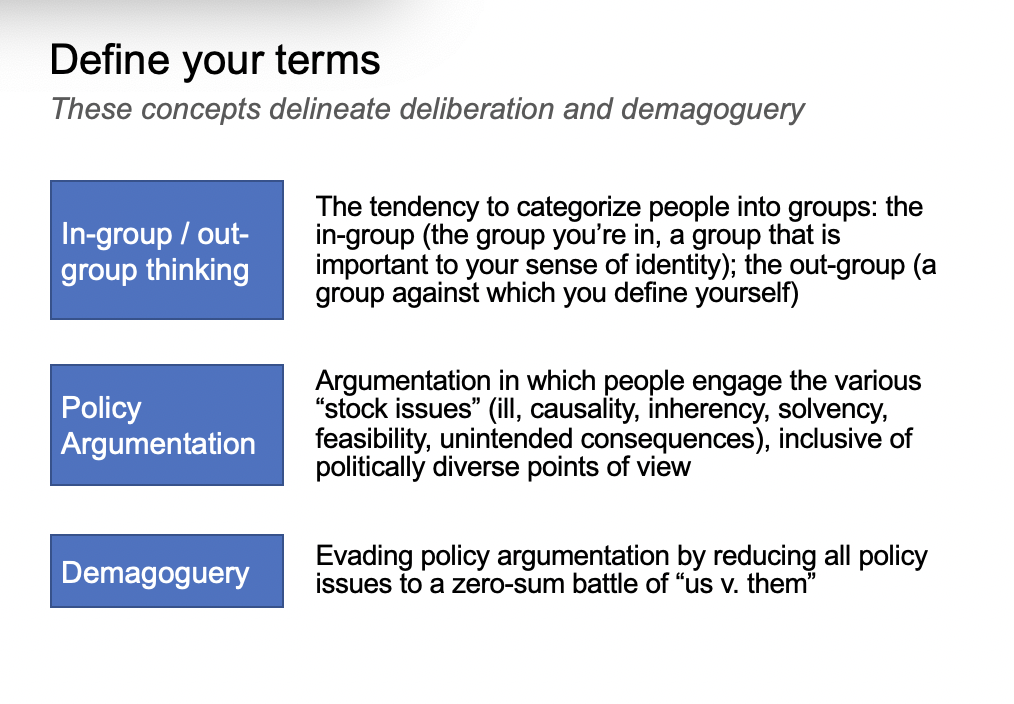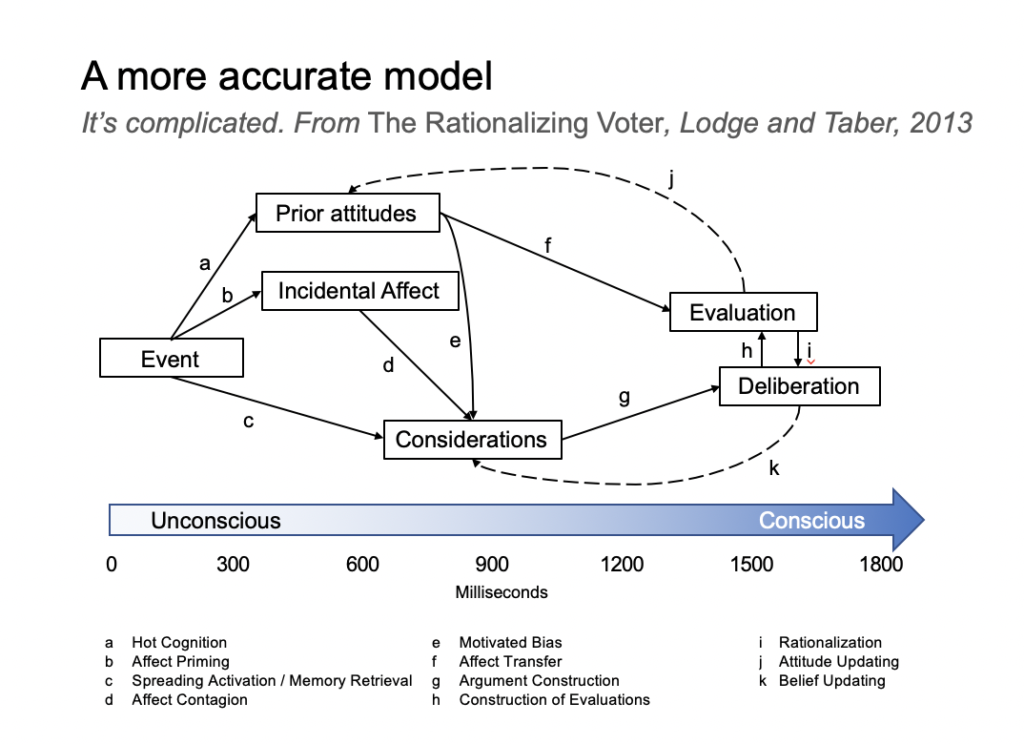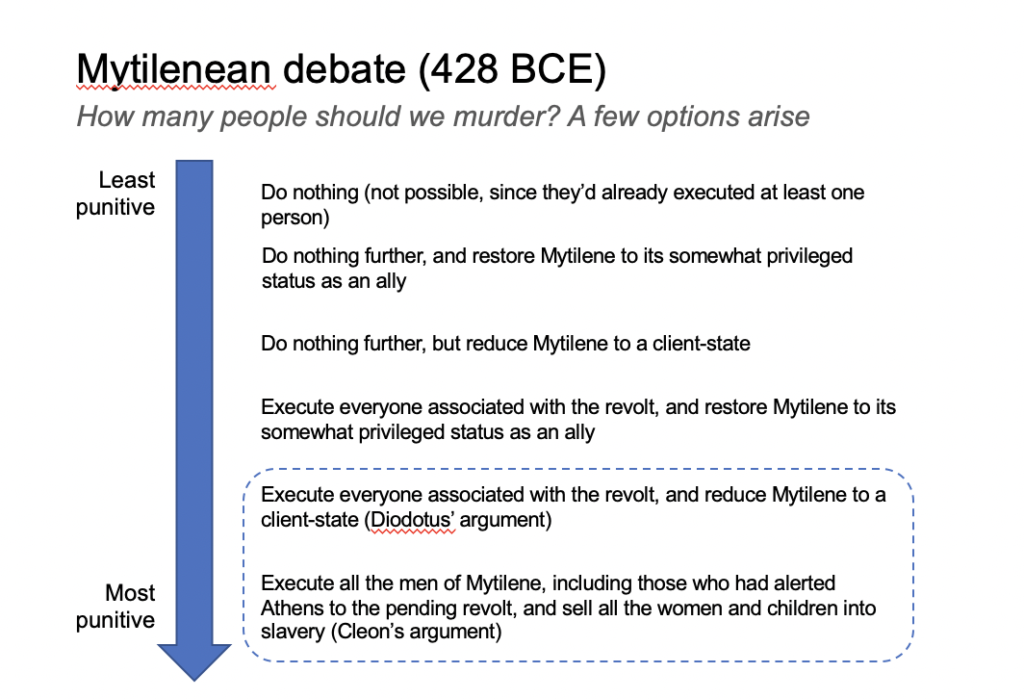
Eighty years ago, almost to the day (April 28, 1939), Adolf Hitler gave a speech in the Reichstag (albeit directed at the world) in which he promised that he wanted only peace: [Slide 2] “Providence showed me the way to free our people from the depths of its misery without bloodshed and to lead it upward once again.” It was his second “peace” speech of the month; in both, he insisted he didn’t want war; he only wanted to make sure Germany got what it was rightfully due. And a surprising number of people believed him.
Benny Morris’ Roots of Appeasement shows that British policies of appeasement through the 20s and 30s came from the reasonable assumption that any rational person would know that the next war would be unthinkably devastating (largely because of the destructive capacities afforded by aircraft), and so various world leaders kept negotiating with Hitler as though he were a rational person working within what was thinkable. After the non-aggression pact was signed with Poland (April 6), even William Shirer—an American radio correspondent–believed that “this will halt Hitler for the time being” (Berlin Diary 163, a view he abandoned when Hitler tore up the agreement on the 28th). On April 23, Shirer said on his broadcast that, among other things, the Germans believed
that Hitler, whether they like him or not, will get what he wants in eastern Europe, and get it—as he got Czechoslovakia at Munich—without a war.[….T]here will therefore be no war, and that they—the German people at any rate—do not want war. And that war can only come if the “encirclement powers”, jealous of Germany’s success, attack the Reich (42)
In his 1984 memoir of his time in Germany, The Nightmare Years, Shirer would say of the spring of 1939,
Like almost everyone else I still clung to the hope for peace—despite what Hitler had said; despite what he had done, tearing up two more treaties; despite all his deceit. (403)
Hitler, who had, for years, spoken of war as a cleansing and necessary rebirth of Germany, was now saying he wanted peace. One of these two postures was a sincere and authentic expression of his values and the other was manipulative–and people had to decide which was which. A lot of people got the answer to the question wrong.
That same spring, while so many people were hoping for peace, and believed that Hitler shared that hope, Hitler was preparing for exactly the kind of war he had long said he wanted. And Kenneth Burke was writing “The Rhetoric of Hitler’s ‘Battle,’” his analysis of Adolf Hitler’s rhetoric in the book Mein Kampf. Burke wasn’t fooled. He began from the premise of taking Hitler’s rhetoric seriously. And he got Hitler’s intentions right. This talk will take seriously Burke’s taking Hitler’s rhetoric seriously.
As Kathleen Hall Jamieson points out, the distinction between actual rather than apparent identity is a central topos in Americans’ assessment of political candidates, and it has a long history:
Resonant in Western culture at least since Plato’s well-known discussion of shadows in the cave, the appearance-versus-reality lens, in US politics, takes the form of questions about a candidate’s actual rather than presented self, real versus publicly expressed beliefs, diagnosed rather than self-proclaimed health, audited rather than feigned financial circumstances, and lived rather than conjured biography. (186)
A study of Hitler’s rhetoric isn’t just a study about Hitler, but, as Burke aptly said, a study of how he swung a great nation in his wake, and how such a person might come to power in the US. And we might wonder about the role of the appearance v. reality lens in such an ascent.
Part of Burke’s answer is straightforward: he lists the rhetorical strategies (some verbal, some not) that such a rhetor would use on the basis of what Hitler used. Another part is more complicated: he points out that Hitler’s rhetorical strategies were grounded in his and Germans’ ways of thinking and acting. Burke says, “The deployments of politics are, you might say, the chartings of Hitler’s private mind translated into the vocabulary of nationalistic events.” (210). Since Hitler’s rhetorical strategies and political actions were so aligned, Burke wonders, “Is such thinking spontaneous or deliberate—or is it rather not both?” (213) In other words, was Hitler authentic in his rhetoric, given that he lied so much but not always?
Robert Citino refers to the “common notion that the surface Hitler is false, that we must dig deeper to unpack his true motives” (406). But, Citino says,
He rarely lied about his intentions. Of all the world statesman of the twentieth century, he may have been the most honest of all. He proclaimed his goals to the German people and to the world, leaving a dense trail of written statements and public proclamations behind him that are still remarkable for their candor. (404).
He did lie, of course, but he was also absolutely truthful at times, including about his lying. Burke points out an odd paradox of Hitler’s “honesty” in Mein Kampf: he shows all his cards; he’s open about all his rhetorical strategies, including his willingness to lie and mislead. Yet, his being open about being a liar did not undermine his ability to gain and maintain trust: “He could explicitly explain his tactics in his book and still employ them without loss of effectiveness.” (212)
In “Rhetoric of Hitler’s ‘Batttle’,” Burke identified various rhetorical strategies:
-
- Strategic misnaming
- Repetition
- Uniforms
- Having thugs beat up hecklers in the audience
- Unifying a diverse group by identifying a shared enemy
- Attributing any resistance to him or his ideas as the consequence of the critic being on the side of evil in the apocalyptic battle between good (Aryans) and evil (the Jew)
- Bastardization of religious forms of thought (i.e., Western European Christian eschatology and soteriology)
- Appealing to the notion of inborn dignity
- Describing Germany as in a symbolic rebirth
- Scapegoating/Projection
- Toggling between and intermingling material and spiritual explanations of events
In this talk, I want to pursue that question of spontaneous or deliberate by looking for these strategies in situations where there’s no obvious rhetorical gain from using them, where, in fact, they harmed deliberation: Hitler’s decision-making regarding the war he started. If repetition, scapegoating, and so on were cunning and strategic, then he wouldn’t have used them as bases of his decision-making when they hurt the war effort. But he did. And so did his generals, and so did many Germans. Burke didn’t just identify rhetorical moves, but ways of organizing and explaining the world.
Strategic misnmaming. Burke observes that in Mein Kampf, Hitler called his ideology of hate one of love. That strategic misnaming ran throughout his rhetoric: he called his invasions “counter attacks,” his war mongering “bringing peace,” and his chaotic polycratic system orderly. So did the Nazis generally, as in the now infamous Nazi language rules that Victor Klemperer describes so elegantly—language rules that Eichmann and his attorney were still following in 1960 as Hannah Arendt observed with some horror. One of Hitler’s most important misnamings was his persistent representation of himself and Germany as victims—something I’ll come back to later.
Repetition. Hitler was notorious for repeating himself in his meetings and speeches —something about which even his generals complained —but, more importantly, his military strategy was itself grounded in the notion of repetition. [Slide 5] His overall plan was to engage in a short, sharp war, in which Germany would retain the initiative, encircle entire divisions of the enemy, and capture massive amounts of land and material immediately. This is the traditional German/Prussian way of war, which military historians point out was Germany’s strategy dating back to Frederick the Great. In Hitler’s version, it relied on mastery of the air, a version that worked tremendously well through 1940. Hitler insisted on repeating that strategy long past the point when it was no longer working—when, for instance, the Luftwaffe was too weak to provide significant air support (really, any time after 1943), and he was in a defensive war of attrition (on both fronts after June 1944, but much earlier on the eastern front). For example, on December 28, 1944, he told his generals “Militarily, it’s critical that in the West we transition from this unproductive defensive posture to offensive warfare. Offensive operations alone can turn the war in the West in a successful direction” (557)
More important, WWII was itself a repetition of The Great War.
Losing a war should cause a country to reconsider its processes of deliberation—the disastrous outcome should cause a country to try to understand how it made that bad decision, and how to prevent a similar decision in the future. Unhappily, the opposite is likely to happen. Effective deliberation about going to war is stymied by the nearly universal sense that admitting a war was a mistake dishonors those who fought in it, by making their sacrifices all in vain. Thus, we are likely to try to refight a war we’ve lost with an increased commitment to the very policies and values that got us into the war in the first place. WWI was caused by nationalism, irrational optimism, desire for European hegemony and, in the case of France and Germany, the desire to relitigate the Franco-Prussian War of 1870.
Many German rhetors (Hitler was just one of them) proposed as a solution to Germany’s losing that war an increased commitment to nationalism, militarism, the desire to refight an old war, hopes of European hegemony, and irrational optimism.
Uniforms. Hitler paid careful attention to uniforms, with help from Hugo Boss, but not necessarily for the motives Burke infers (to convey authority)—I think he really liked uniforms. During his January 27, 1945 meeting with his generals—a time when the Soviets are rolling over German forces in the East and Anglo-American forces are rolling over them in the West, a time when careful thinking was desperately necessary—General Alfred Jodl mentions that Cossacks would participate in an action in the Papuk mountains (in Croatia), and Hitler responds:
The Cossacks are good. But why do we have to put them in German uniforms? Why don’t we have those beautiful Cossack uniforms?
Jodl: Most of them have Cossack uniforms.
Guderian. Red fur hats.
[Hitler]: Do they still have those?
Jodl: They have red trousers with silver stripes.
[Hitler]: We have to leave that. It’s wonderful. (Heiber, 650)
I think we have to consider that the brownshirt uniforms were so carefully designed not because Hitler had a cunning reason, but because Hitler really cared about uniforms, even when that concern was irrelevant, and possibly distracting.
Violence. Hitler continued the practice of public beatings of dissenters, intended to make his base feel like winners and intimidate potential critics.
Unification through common enemy. He unified Germany by making most of the major world powers his literal enemies (which worked up to a point—his popularity probably hit its height in 1941, with many people remaining or becoming loyal to Hitler and the Nazis because of the Allied bombings).
Accusing all dissenters of being Jewish. He, and the Nazis, characterized anyone who disagreed with them as either Jewish (their explanation of Roosevelt’s hostility) or controlled by Jews (their explanation of Churchill’s opposition).
Symbolic rebirth. The trope of symbolic rebirth turned up in virtually every speech, usually at the beginning (as it does in Triumph of the Will), but was also the basis of his remilitarizing Germany.
Inborn dignity. Hitler’s notion of inborn dignity—that Aryans/Germans are divinely entitled to world domination because of inborn superiority—informed his military decisions, to his detriment. As late as 1944, Hitler thought that he just needed one good win to get the US to sue for peace; David Stone says that Hitler
believed that the American soldiers were generally of poor quality, with potentially fragile morale, and were therefore vulnerable to a decisive counterstroke delivered as a complete surprise once they had over-extended the lines of supply upon which they depended. (Shattered Genius 328)
Hitler’s tendency to make bad military decisions on the basis of racist and nationalist stereotypes was shared with others. The Wehrmacht wildly underestimated the USSR because Nazis “looked down on Russians as untermenschen, racially inferior and therefore incapable of outsmarting the master race. As a result, the Wehrmacht continually fell for Soviet deception and was wrong-footed by most major Red Army offensives” (Dick 105-6).
That’s important: the Nazis’ (not just Hitler’s) belief in inborn dignity caused Nazis to make bad decisions, and the bad outcomes of those bad decisions never caused them to reconsider their racist premises.
Projection/scapegoating. Racist and nationalist premises directly relate to Hitler’s, Nazis’, and Germans’ propensity for projection and scapegoating. Germans were drawn to scapegoating Jews for the loss of The Great War partially because they couldn’t imagine that the Allies had superior military forces and strategies. Hitler’s tendency toward projection also meant that he assessed a situation in terms of what he would do, believing that everyone thought exactly like him—thus, the whole basis of Germany’s aggression (the terror of encirclement) assumed that all other countries had the same aspirations for European hegemony, and the same war-mongering goals.
Crucial to Nazi success was that the Nazi party relentlessly promoted a popular and comfortable narrative about its current problems. Germany’s decision to back Austria’s move in regard to Serbia (the catalyst of WWI) was grounded in aspirations for intra-European hegemony and a profound underestimation of their opposition. It was probably unwinnable for Germany the moment it became a war of attrition (after the failure to win the Battle of the Marne, or once the race to the sea turned into a stalemate), but definitely after the 1918 “Spring Offensive” failed (McElligott 21). Although Erich von Ludendorff had come to the conclusion that the war was unwinnable in September of 1918, he later—like Hitler and far too many other Germans–blamed the loss of the war on the mythical “stab in the back” (a reference to the ending of Wagner’s Twilight of the Gods) on the part of a liberal/Marxist/Jewish press and conspiracy.
In other words, projection and scapegoating about WWI were not just rhetorical moves on the part of Hitler in Mein Kampf, but ways of thinking that formed the bases of actions on the part of people long before Hitler even began speaking in beerhalls. Burke identified ways of thinking that informed individual and national behavior not just limited to Hitler.
This leaves the materialization/spiritualization move—the one my students find most difficult and yet, once they get it, most powerful. And, again, Hitler’s shifting and mingling material and spiritual explanations wasn’t just a rhetorical move that Hitler himself sometimes cunningly chose in order to deceive, deliberately, his audience. When he shifted, it was because the shift confirmed a basis of belief beyond argument.
In “Rhetoric of Hilter’s ‘Battle’” and War of Words, Burke mulled over the way that people alternate between spiritual and material explanations of phenomena, and he identified something it would take cognitive psychologists thirty years to acknowledge. Essentially, what Burke noticed is that we can deflect disconfirming evidence and/or resolve cognitive dissonance by reframing our explanations (involving what Wayne Booth would later call “motivism”).
Burke points out the “ominous” temptation of transforming “material interests” into “their corresponding ‘ideals’” (76). This toggling between material and ideal explanations, and the deflecting of material considerations by reframing them as really idealistic, was typical of Nazi rhetoric, perhaps most notoriously in Heinrich Himmler’s “Posen” speech—when he tries to reframe concentration camp sadism as courage and idealism.
Hannah Arendt aptly described the Nazi explanation of the war:
the lie most effective with the whole of the German people was the slogan of ‘the battle of destiny for the German people’ […] which made self-deception easier on three counts: it suggested, first, that the war was no war; second, that it was started by destiny and not by Germany; and, third, that it was a matter of life and death for the Germans, who must annihilate their enemies or be annihilated. (Eichmann 52)
Although she doesn’t use the terms, she’s pointing to deflection through idealization.
Hitler’s careful calculations of material conditions (such as the need for oil, tungsten, and consumer goods) persuaded him that he had to have won the war within three years, and that could only happen if he could avoid a two-front war, or, if worse came to worse, if he could dispatch the USSR within six months. By the summer of 1942, it was clear that he had failed on all three points. He hadn’t won in three years, he had a two-front war, the USSR was holding a line, and, even worse, the US was now involved.
Initially, Hitler’s mastery of material conditions and factors was impressive (from 1933 to 1941)—but, as those conditions deteriorated (1941-1945), he shifted more and more to spiritual explanations, to the point of absurdity.
On December 12, 1942, Hitler discussed with his generals the very grim situation of the Sixth Army encircled in and near Stalingrad. His generals tried to persuade Hitler of the serious material problems in order to get him to order, if not a fighting retreat of the army as a whole, at least a series of strategic retreats that would reduce the number of vulnerable salients. At one point, General Kurt Zeitzler tells Hitler “we have received from here reports of deaths caused by exhaustion—14 cases within 6 days” (19).
Zeitzler goes on to explain that relieving troops wouldn’t be able to get there anytime soon (if at all), and that, despite Goering’s assurances, even the Luftwaffe wasn’t able to solve the issue through delivering supplies. He tells Hitler,
[T]hey have to sit on this narrow front day and night, and they’re on the alert all night and have to get out. An example: the men don’t even take off their pants anymore; they just leave them on. (37)
Hitler responds by giving a lecture about the relative value of the troops in terms of their racial purity (that is, inborn dignity), whingeing about how he was right when his generals were wrong (scapegoating and projection—he had been wrong), and ends with, “I have to say one thing in all of these cases, I get too few suggestions from the Army for the Knight’s Cross” (37).
Hitler appears to believe that the material problems of the 6th Army (cold, severe shortages of food, fuel, and supplies) could be solved if they were given more medals. Material conditions could be overcome with sufficient will (spiritual) which could be fostered by medals (material and spiritual?)
In May of 1943, Hitler’s generals pointed out that there were difficulties getting Nazi troops from Sicily to the Italian mainland because of the destruction of the ferries. Hitler said, “the decisive element is not the ferry, but the will” and “Where there is a will there is a ferry” (137).
Hitler made bad military decisions because he sincerely believed in the power of the will—the spirit’s ability to triumph over material conditions. And he wasn’t alone in that belief. Citino describes the leadership of the Wehrmacht:
One of the characteristics of Prussian-German field commanders over the centuries had been their notion that they were capable of mastering even the most difficult strategic situation, the worst imbalance of men and materiel, and they could do it through sheer force of will (Retreat 26)
One of the odder instances of Hitler’s mingling of material/spiritual frames is the literalizing of metaphors through historical/religious typology.
Burke’s argument is that Hitler’s rhetoric worked because it was a bastardization of religious forms of thought, and I completely concur. Burke didn’t mention typology, another religious concept bastardized by demagogues. Typology is a way of reconciling the Hebrew Bible and New Testament by saying that characters in the Hebrew Bible are types that will be re-presented in the New Testament, and in the end times of Christianity. Oddly enough (or perhaps not), it’s long been a way to rationalize unethical behavior on the part of political and religious figures. For instance, 17th century American Puritans justified genocidal policies toward the indigenous peoples through identifying their in-group figures as the same type as some Hebrew Bible figure who had killed other peoples—such as Joshua or David. And think of the number of religious figures caught in adultery who claim to be David (a seriously flawed use of typology, as even conservatives admit).
Nazi typology regarding Hitler made him religious and historical: he was Charlemagne, Frederick Barbarossa, Frederick the Great, Napoleon, Jesus . As things got materially worse for the Nazis and Germany was clearly losing the war, Hitler seems to have started believing that the comparison to Frederick the Great was not just an analogy, or even metaphor, but a matter of fact—so true that Hitler could make plans based on Frederick the Great’s military career being a perfect prediction of his own. Because the Russian Empress Elizabeth’s death in 1761 caused the coalition of allies to fracture as they were advancing on Berlin (as part of what is commonly known as the Seven Years War), thereby saving Frederick from defeat, Hitler’s strategies for the war in 1945 were to hold out until Roosevelt’s death would cause the same fragmenting of the allies.
Speer describes the scene in Hitler’s bunker April 12, 1945 (less than a month before Berlin was over-run) when Hitler got news that Roosevelt had died:
Hitler caught sight of me and rushed toward me with a degree of animation rare in him these days. He held a newspaper clipping in his hand. “Here, read it! Here! You never wanted to believe it! Here it is!” His words came in a great rush. “Here we have the miracle I always predicted. Who was right? The war isn’t lost! Read it! Roosevelt is dead!”
He could not calm down. He thought this was proof of the infallible Providence watching over him. Goebbels and many others were bubbling over with delight as they exclaimed how right he had been in his reiterated conviction that the tide would turn. Now history was repeating itself, just as history had given a hopelessly beaten Frederick the Great victory at the last moment. The miracle of the House of Brandenburg! Once again the Tsarina had died, the historic turning point had come, Goebbels repeated again and again and again. (Inside the Third Reich, 549)
It’s as though they lost track of the comparison to Frederick the Great being a typological interpretation—an idea—and saw it instead as a material fact.
As an aside, I should mention that much of his understanding of America came from the cowboy and Indian stories of Karl May, just as his understanding of German destiny was drawn more from Wagner than any historian—the real and ideal were more than a little muddled for Hitler and his followers.
I have to say that the most irritating aspect of this project for me has been Nazis’ persistent propensity to feel sorry for themselves. Eichmann, the Nazis on trial in Nuremberg, the generals in their self-serving and fundamentally dishonest post-war memoirs, Goebbels in his diaries, and Hitler at every opportunity—they all whined. Even Albert Speer, who at least had the grace to be genuinely shocked at the films of concentration camps shown at his trial, whined during his sentence in Spandau Prison, without ever acknowledging that, as boring as his incarceration was, no matter how bad the Russian food, how ugly the paint on the walls, or how petty the rules, it was worlds better than the conditions under which the slave laborers in his factories lived, let alone the conditions of victims in the concentration camps he helped to build.
Arendt remarked on that same “trick” (her term): “So that instead of saying: What horrible things I did to people!, the murderers would be able to say: What horrible things I had to watch in the pursuance of my duties, how heavily the task weighed upon my shoulders!” (Eichmann 106).
While I think that some of the victim posture is related to what Paul Johnson has called “the rhetoric of masculine victimhood,” I think that most of it is what Burke calls deflection. And deflection works by breaking one association and creating another.
Ernesto Laclau argued that populist reason works by “equivalential chains”—the demands of various people who are identified as “the people” perceive “an accumulation of unfulfilled demands” as essentially equivalent. Clean water is much like good wages is much like good schools (73). And, as he noted, as we move along the chain, the connections among the links might be tenuous, such as between clean water and good wages (75). He also observes that the creation of equivalential chains is part of a three-part process, including, as the second step, “the constitution of an internal frontier dividing society into two camps” and the third step is “the consolidation of the equivalential chain through the construction of a popular identity which is something qualitatively more than the simple summation of the equivalential links. “(77). That is, the in-group.
It’s that second step—the two camps move—that Laclau didn’t follow up in his discussion of equivalential chains; but it’s important. Equivalential chains, or the associations and identifications that Burke noted, aren’t just about who we are—it’s about who we are not. That insight is acknowledged, but also not really pursued, in Chaim Perelman and Lucie Olbrechts-Tyteca’s explanation of dissociation. To show dissociation, they have pages of maps of the paired terms that someone dissociates—they’re more interested in the dissociation, but I think the concept of paired terms deserves more attention.
What The New Rhetoric notes, although just in an aside, is that a valued term is valued because it is asssoiated with another valued term and it is not the devalued term. [Slide 10] For example, Jamieson describes the rhetoric of the 2016 pro-Trump trolls:
Those who endanger us include Muslims, illegal aliens, Black Lives Matter activists, atheists, demanding women, those who oppose gun rights, and Hillary Clinton, to name a few. Among those cast as ‘we’ were white males, Donald Trump, Christians, veterans, and workers whose jobs are threatened by bad trade deals and job-stealing ‘illegals’. (45)
That’s paired terms.

There are, as Laclau says, terms that are tenuously connected—advocates of the MOAR GUNZ NRA rhetoric are not particularly likely to be Christian, and there are feminist Christians, BLM activists are not necessarily opposed to gun rights, and atheists have little to do with Muslims—out-group terms only share that they are opposed to some value associated with the in-group.
When people make judgments simultaneously by association and opposition, then all sorts of odd things get connected. Burke notes the paradox that Hitler, in Mein Kampf, condemns Jews as both communists and capitalists—that association works because, for his audience at the time, capitalist (meaning people who oppress the working class) and communist (meaning anything to the left of Hitler) were both on the “them” side of paired terms. They aren’t logically associated with each other, but only associated through a similar place in the associational/binary method of reasoning in which we too often engage. I think one of the best examples of this associational/binary method of reasoning is the German/Nazi victim stance.
The set of paired terms that enables that stance is:

Because there are only two possible positions—victim or persecutor—and those two are completely opposed, if you can show that you are, in any way, a victim, you have shown that the other side must be the persecutor.
What the Nazis did, prior to every invasion, was publicize or fabricate acts of aggression against “Germans” (such as discrimination against speakers of German in Czechoslovakia, the faked attack in Poland, lies about the number of Soviet tanks on the border). Any action against any “Germans” (such as German-speaking Czechs) justified any violent response on the part of Nazi Germany—regardless of provocation, regardless of proportion. It’s interesting to me that, even after the war, when every reasonable person would have concluded that the Nazis lied, and nothing they said should be believed, many people still cited Nazi claims of victimizations as justifications for what Germany did. And that included people who believed that they had rejected Nazism and seen the light.
Hannah Arendt argued that language was important for self-deception, and that one kind of self-deception was the failure to think. Her argument on that point was misunderstood and misrepresented—she never said that Adolf Eichmann was an automaton, or mindless, and certainly not stupid. In Life of the Mind, she described what she saw at the trial:
It was not stupidity but thoughtlessness. [….] Cliches, stock phrases, adherence to conventional, standardized codes of expression and conduct have the socially recognized function of protecting us against reality (Life 4).
Eichmann thought—he thought very carefully about what trains to use, where to send them, how to rob Jews more effectively, how to send as many as possible to camps. He thought a lot about his career. Hitler thought very carefully about how to conduct a war of annihilation, what weapons should be developed, what troops should be sent where. And his generals also thought very carefully about how to do their jobs.
But, as far as Arendt was concerned, Eichmann wasn’t thinking because he had an “almost total inability ever to look at anything from the other fellow’s point of view” (48). He, like Hitler, thought he knew what others were thinking, but he didn’t, because he just assumed they thought the same things he did. For instance, he whinged to his Jewish guards about his failure to advance as far in the SS as he had hoped, and he expected the guard to sympathize. He engaged in projection.
The strategies that Burke identified weren’t just deliberate rhetorical strategies of Hitler’s: they were ways of thinking shared with enough people to put and keep him in power. And the notion that Hitler was authentic, despite, or perhaps even because of, his persistent inaccuracy and dishonesty, was important to that success. When we ask if Hitler was sincere or manipulative we ask the wrong question because we falsely assume that there is a distinction between being authentic and being deceptive, and there isn’t.
Jamieson points out the importance of the perception of Clinton as disingenuous and Trump as authentic for voters in 2016:
Unlike Trump, whose freewheeling rhetoric was consistent with the assumption that ‘what you see is what you get,’ Clinton’s wariness of the press, caution when speaking extemporaneously, and discomfort with personal narrative all invited audiences to read between the lines while also asking, what wasn’t she saying. (206)
I’m saying that the concept of paired terms explains the paradox of someone deciding that someone who has a book in which he talks about his reliance on dishonesty to get good deals would seem authentic and trustworthy. Telling someone that you lie to others should make you less reliable, but, as Burke said, by including you in the scam, the scammer might get you to think that he wouldn’t lie to you. A self-confessed liar can seem authentic as long as s/he seems to care, sincerely, about the in-group, and that is signaled through having the right paired terms.
What paired terms enable is the deflection that Burke noted is done through shifting between spiritual and material explanations. Clinton’s admission of saying different things to different audiences is given a different spiritual explanation—it’s a sign of who she is; it’s a consequence of her being a bad person. Trump’s admission of saying different things to different people is explained as made necessary by external factors, as coming from sincere concern for in-group members. Clinton’s deceptiveness means she can’t be trusted; Trump’s means he can.
For in-group members, a logically incoherent argument that plays the paired terms effectively—that signals a shared understanding of in-group and enemy, through what terms are associated, and which ones are set in opposition—resonates with a base looking for someone who really gets them. Whether that leader is being accurate doesn’t matter—his shared in-group identity is authentic, and that’s enough.
There is a conventional view of Hitler as a magician with a word wand who hypnotized, seduced, or scammed passive Germans. He wasn’t. He was a grifter who made millions from Mein Kampf and never paid taxes, who said he would use his personal wealth to pay for various government expenditures (he didn’t, but people might have thought he did), and who persuaded the conservative (left-phobic) elite and middle class that he unapologetically believed in the inborn dignity of whites to dominate in Germany and for Germany to act without restraint on the part of the goals of other countries.
Hitler didn’t magically convert people to that point of view—he gave expression to what a lot of Germans thought. Nazi rhetoric provided ways of thinking about German actions that made people more comfortable with something they already wanted to do. Persuasion is always really self-persuasion, and deception is always self-deception—the rhetoric of others just gives us the tools we can choose to use to persuade ourselves. [Slide 13] In regard to the 2016 election, Jamieson says, “When voters integrate their own assumptions into content, they become accomplices in their own persuasion” (83). Or, in Burke’s words, “
Our job, then, our anti-Hitler Battle, is to find all available ways of making the Hitlerite distortions of religion apparent, in order that politicians of his kind in America be unable to perform a similar swindle (219)













 The dominant model of how we reason is what is often called “naïve realism.” It says that, if we’re going to make a decision, we should first try not to have any preconceptions (this isn’t possible, by the way). We should first look at the data, perceive the information, then reason. You can make sure that you’re right by going through this process again.
The dominant model of how we reason is what is often called “naïve realism.” It says that, if we’re going to make a decision, we should first try not to have any preconceptions (this isn’t possible, by the way). We should first look at the data, perceive the information, then reason. You can make sure that you’re right by going through this process again.

